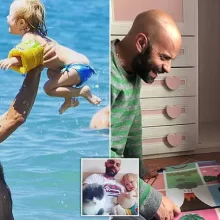Widow Donates $1 Billion to Cover Tuition for NYC’s Poorest Area Forever
The post Widow Donates $1 Billion to Cover Tuition for NYC’s Poorest Area Forever appeared first on Healthy Holistic Living.
In the heart of New York City’s Bronx, a story of extraordinary generosity and vision unfolds, capturing the essence of what one individual’s act of kindness can achieve. Dr. Ruth Gottesman, a former professor and a towering figure at the Albert Einstein College of Medicine, has turned personal loss into a beacon of hope for countless future medical professionals. Following the passing of her husband, she made a groundbreaking decision: to donate $1 billion to ensure that tuition fees at the Albert Einstein College of Medicine would be covered forever. This isn’t just a story about philanthropy; it’s a narrative that intertwines loss, legacy, and an unyielding belief in the power of education. As we delve into this tale, we uncover the layers of Dr. Gottesman’s contribution, not merely in financial terms but in its potential to transform lives and the future of healthcare itself. Through her vision, the Bronx’s brightest minds are offered a lifeline, a chance to pursue their dreams unencumbered by financial barriers. Join us as we explore the depths of Dr. Gottesman’s impact, a testament to the profound difference one individual’s actions can make in the world.
The Legacy of Dr. Ruth Gottesman
Dr. Ruth Gottesman’s story at the Albert Einstein College of Medicine is not just a recent phenomenon sparked by a generous donation. Her journey with the institution began in 1968, marked by a series of achievements that have left an indelible mark on the college. Taking the helm as the “Director of Psychoeducational Services,” Dr. Gottesman’s career trajectory saw her eventually becoming the chair of the board of trustees. Her work, particularly in studying learning disabilities and developing screening tests, showcased her dedication to advancing medical education and support services.
But beyond her professional milestones, Dr. Gottesman’s personal life, especially her partnership with her late husband David, known affectionately as Sandy, played a pivotal role in shaping her philanthropic path. Sandy Gottesman, a man of remarkable foresight and kindness, left behind a legacy that would extend beyond his own achievements. His decision to bequeath a portfolio of Berkshire Hathaway stock to his wife, with the simple instruction to “Do whatever you think is right with it,” laid the foundation for what would become one of the most significant donations in the history of U.S. education.
This gesture of trust and love from Sandy did not just signify a transfer of wealth; it symbolized a shared belief in the power of giving back, a value deeply embedded in the Gottesman family. Driven by this principle and supported by her children’s encouragement, Dr. Gottesman embarked on a mission to make a lasting difference. Her decision to fund tuition fees in perpetuity is a testament to her commitment to education and her desire to honor her husband’s legacy in a manner that resonates with their shared values of generosity and support for those in need.
The Significance of the Donation
Dr. Ruth Gottesman’s unprecedented donation of $1 billion to the Albert Einstein College of Medicine represents a monumental moment not just for the institution, but for the landscape of medical education in the United States. This act of generosity is one of the largest single contributions ever made to a U.S. school, and it is likely the most substantial donation specifically targeting a medical university. The significance of this gift cannot be overstated, as it addresses a critical barrier to medical education: the daunting cost of tuition.
The impact of Dr. Gottesman’s donation extends far beyond the immediate financial relief for students. It sends a powerful message about the value of accessible education and the importance of supporting those who aspire to serve in the medical field. By covering tuition fees for future students, Dr. Gottesman is not just alleviating financial burdens; she is investing in the future of healthcare, ensuring that economic barriers do not hinder the next generation of medical professionals.
This donation comes at a critical time. The Albert Einstein College of Medicine, situated in the Bronx—New York City’s poorest area—is a beacon of hope and excellence in a community that faces significant health disparities. The borough is often cited as having some of the most challenging health metrics in the state, making the presence of a top-tier medical institution like Einstein not just important but vital. Dr. Gottesman’s contribution thus has a dual significance: it supports the education of future healthcare providers while also reinforcing the institution’s role as a cornerstone of hope and health in the Bronx.
Furthermore, the donation challenges the prevailing trend of philanthropic giving in education, where prestigious institutions with abundant resources attract the lion’s share of contributions. By directing her generosity towards Einstein College, located in an underserved area, Dr. Gottesman highlights the need for more equitable support in the educational sector. Her gift is a call to action for other philanthropists to consider the impact of their donations and to invest in institutions that serve as lifelines to their communities.
The demographic makeup of the student body at Einstein, with a significant representation of women and a diverse racial composition, underscores the importance of this donation in fostering an inclusive and representative medical workforce. By removing financial barriers, Dr. Gottesman’s gift ensures that all students, regardless of their economic background, have the opportunity to pursue their dreams of becoming medical professionals.
The Challenge of Tuition Costs
The issue of soaring tuition costs is not unique to the Albert Einstein College of Medicine, but a widespread challenge affecting aspiring medical professionals across the United States. With the cost of medical education reaching unprecedented heights, many students find themselves grappling with the prospect of incurring substantial debt, a reality that can shape career choices and influence the very fabric of healthcare access and delivery.
Medical students often leave their institutions burdened with debt exceeding $200,000, a staggering sum that underscores the financial barriers to entering the profession. This economic strain is not merely a personal burden; it has broader implications for healthcare equity and diversity. High tuition costs disproportionately affect students from underprivileged backgrounds, who might forego the pursuit of a medical career due to financial constraints. This exclusion not only diminishes the diversity within the medical field but also impacts the availability of healthcare providers in underserved areas.
The situation at the Albert Einstein College of Medicine, situated in New York’s Bronx, highlights a stark contrast. While some New York schools report lower levels of student debt, the financial challenges faced by Einstein’s students are compounded by the socioeconomic realities of the Bronx, one of the city’s poorest areas. The promise of Dr. Ruth Gottesman’s donation to cover tuition fees in perpetuity is a beacon of hope, illuminating the path toward a more equitable and accessible medical education.
This gesture is more than philanthropy; it’s a strategic intervention in the cycle of debt that hampers the medical profession. By eliminating tuition for Einstein students, Dr. Gottesman is not only alleviating individual financial burdens but also addressing a systemic barrier that limits diversity and inclusivity within the medical field. This visionary approach recognizes that the cost of education should not deter talented individuals from pursuing careers in medicine—a profession that thrives on diversity of thought, background, and experience.
The impact of Dr. Gottesman’s donation extends beyond the immediate beneficiaries. It sets a precedent for how philanthropy can shape the landscape of medical education, encouraging other institutions to reconsider how they can make healthcare careers more accessible to all, regardless of financial background. By confronting the challenge of tuition costs head-on, Dr. Gottesman’s contribution paves the way for a future where medical students can pursue their education and career goals unencumbered by financial constraints.
Dr. Gottesman’s Vision for Education
At the heart of Dr. Ruth Gottesman’s monumental donation lies a clear and compelling vision: to democratize access to medical education, ensuring that the future generation of healthcare professionals is defined not by their financial capacity but by their talent, dedication, and passion for serving communities. This vision is not just about alleviating the financial burden of tuition; it’s about creating a ripple effect that will transform the landscape of healthcare education and, subsequently, healthcare delivery across communities.
Dr. Gottesman’s decision to fund tuition for students at the Albert Einstein College of Medicine in perpetuity is a testament to her belief in the transformative power of education. By removing the financial barriers to medical school, she opens the door for a more diverse and inclusive cohort of medical students. This diversity is crucial for the medical profession, as it brings a breadth of perspectives, experiences, and understanding that can enhance patient care, especially in underserved communities like the Bronx, where Einstein is located.
Her vision extends beyond the immediate impact on students’ financial situations, aiming to inspire a sense of responsibility and philanthropy in the medical professionals of tomorrow. By experiencing firsthand the benefits of such a generous gift, students might be encouraged to give back to their communities and support future generations in similar ways. This creates a virtuous cycle of giving and service, reinforcing the values at the core of the medical profession.
Moreover, Dr. Gottesman’s approach challenges the traditional narratives around philanthropy in education. By choosing to invest in an institution located in one of New York’s poorest areas, she underscores the importance of supporting schools that serve as vital resources for their communities. This act of generosity serves as a call to action for others, highlighting the need for targeted investments that can make a significant difference in leveling the playing field for all aspiring medical students.
The implications of Dr. Gottesman’s donation are far-reaching. It not only ensures that financial need will not deter talented individuals from pursuing a career in medicine at Einstein but also sets a benchmark for how philanthropic efforts can and should prioritize educational equity. This vision of a more accessible medical education system reflects a broader commitment to social justice, equity, and the belief that healthcare should be a right, not a privilege.
Dr. Gottesman’s legacy is thus characterized not only by her financial contribution but by her ability to inspire change and foster a culture of giving and inclusivity. As we continue to explore the impact of her generosity, it’s clear that her vision for education has the potential to reshape the future of healthcare, making it more representative, compassionate, and accessible to all.
A Friendship That Changed Futures
The transformative donation by Dr. Ruth Gottesman to the Albert Einstein College of Medicine was not only a result of her vision for educational equity and her philanthropic spirit but also was deeply influenced by a remarkable friendship. This bond, formed between Dr. Gottesman and Dr. Philip Ozuah, the president of Montefiore Medicine, exemplifies how personal connections can lead to impactful collaborations that extend far beyond individual relationships, influencing entire communities and future generations.
Their friendship began under rather serendipitous circumstances, seated next to each other on a flight from West Palm Beach. During the journey, they discovered shared interests and values, particularly regarding their passion for improving healthcare and education. This chance meeting blossomed into a deep mutual respect and collaboration, setting the stage for a groundbreaking partnership.
Dr. Ozuah, a pediatrician who oversees both the college and the Montefiore Medical Center, shared Dr. Gottesman’s commitment to making medical education more accessible. Their conversations revealed a shared understanding of the challenges facing medical students, particularly the burden of tuition costs. It was during one of these discussions that Dr. Gottesman posed a question that would mark the beginning of a historic initiative: if presented with a transformative gift, how would it best serve the medical school? Dr. Ozuah’s immediate response, to make tuition free, resonated with Dr. Gottesman’s own thoughts, aligning perfectly with her vision.
This exchange illustrates the power of friendship and mutual respect in catalyzing significant change. It wasn’t just their shared professional backgrounds that made this partnership effective, but their personal connection and shared empathy for students facing financial hurdles. Their friendship became a conduit for change, transforming a personal bond into a lifeline for countless students.
Dr. Ozuah’s influence on Dr. Gottesman’s decision to proceed with the donation highlights the importance of community and support in philanthropy. It’s a reminder that behind every act of generosity, there are stories of personal connections and shared dreams. This friendship did not just lead to a donation but forged a partnership that would shape the future of the Albert Einstein College of Medicine and set a precedent for how personal relationships can inspire public good.
Their collaboration is a testament to the idea that when individuals come together, united by a common goal, they can enact substantial change. This story of partnership and mutual support underscores the broader theme of the article: that individual actions, inspired by shared values and connections, can have a profound impact on society.
The Ripple Effect of Generosity
Dr. Ruth Gottesman’s unparalleled donation to the Albert Einstein College of Medicine does not just end with the financial support it provides to countless students. Its true value lies in the ripple effect of generosity it initiates—a cascading impact that reaches far beyond the immediate beneficiaries of free tuition. This act of philanthropy serves as a beacon, inspiring others to consider how their contributions, regardless of scale, can foster significant change within their communities and beyond.
The decision to make such a substantial donation, and the way it was influenced and executed, underscores a profound belief in the power of collective goodwill and the potential for philanthropy to transform lives. It highlights how acts of kindness, especially when thoughtfully directed, can amplify opportunities for those in need, breaking down barriers to education and success.
Dr. Gottesman’s humility in this process is particularly noteworthy. Opting not to attach her name to the donation, she demonstrates a selfless approach to giving, emphasizing the cause over personal recognition. This humility, however, does not diminish the inspirational power of her gesture. On the contrary, it amplifies the message that the essence of true generosity lies in its intent to uplift others, not in the accolades it might bring to the donor.
This story of generosity has the potential to inspire a new wave of philanthropy, particularly in sectors like education and healthcare, where the impacts of such contributions can be life-changing. Dr. Philip Ozuah’s insistence on sharing Dr. Gottesman’s story is a testament to the belief that witnessing acts of kindness and generosity can motivate others to reflect on how they, too, can make a difference. It’s a call to action for individuals and communities to consider the broader implications of their generosity, encouraging a culture of giving that prioritizes the greater good.
Moreover, the legacy of this donation is not just in the financial relief it provides but in the example it sets. It challenges the status quo of educational funding, demonstrating the profound effects that targeted, thoughtful philanthropy can have on addressing systemic issues. The story of Dr. Gottesman’s donation is a powerful reminder that individuals have the capacity to enact significant change, influencing not just the immediate recipients of their generosity but also setting a precedent for future acts of kindness.
A Legacy of Generosity: Shaping the Future Through Visionary Philanthropy
The narrative of Dr. Ruth Gottesman’s unparalleled contribution to the Albert Einstein College of Medicine encapsulates more than a tale of financial philanthropy; it’s a profound testament to the power of individual action in catalyzing widespread, lasting change. Through her decision to donate $1 billion to cover tuition fees in perpetuity, Dr. Gottesman has not only alleviated the financial burden for countless current and future medical students but has also laid a foundation for a more inclusive, equitable, and diverse medical profession.
This story resonates as a beacon of hope and a call to action, illustrating how personal loss and legacy can inspire actions that transcend individual lifetimes, impacting generations. Dr. Gottesman’s journey from grief to giving stands as a powerful reminder of the capacity for kindness and vision to emerge from personal trials, channeling personal resources into collective benefits.
Moreover, the friendship between Dr. Gottesman and Dr. Ozuah, pivotal in the realization of this donation, highlights the importance of human connections and shared values in fostering significant societal advancements. Their collaboration exemplifies how shared visions for a better world can unite individuals in efforts that redefine the possibilities of philanthropy and social responsibility.
As we reflect on the ripple effect of Dr. Gottesman’s generosity, it’s clear that the true value of her donation lies not only in the financial support it provides but also in the inspirational example it sets. It challenges each of us to consider how our actions, big or small, can contribute to the betterment of society. It underscores the importance of humility, vision, and the belief that one person’s legacy can indeed shape the future.
Dr. Gottesman’s gift to the Albert Einstein College of Medicine is a landmark in the annals of philanthropy, setting a precedent for how thoughtful, targeted generosity can address systemic challenges and unlock the potential of countless individuals. As this story continues to inspire others to act with kindness and vision, it reaffirms the belief that today’s generosity can profoundly shape the future of healthcare, education, and society at large.
Dr. Ruth Gottesman’s donation is more than a historical footnote; it’s a living legacy that will continue to inspire, challenge, and catalyze change, reminding us all of the transformative power of generosity and the enduring impact of visionary action.
The post Widow Donates $1 Billion to Cover Tuition for NYC’s Poorest Area Forever appeared first on Healthy Holistic Living.












